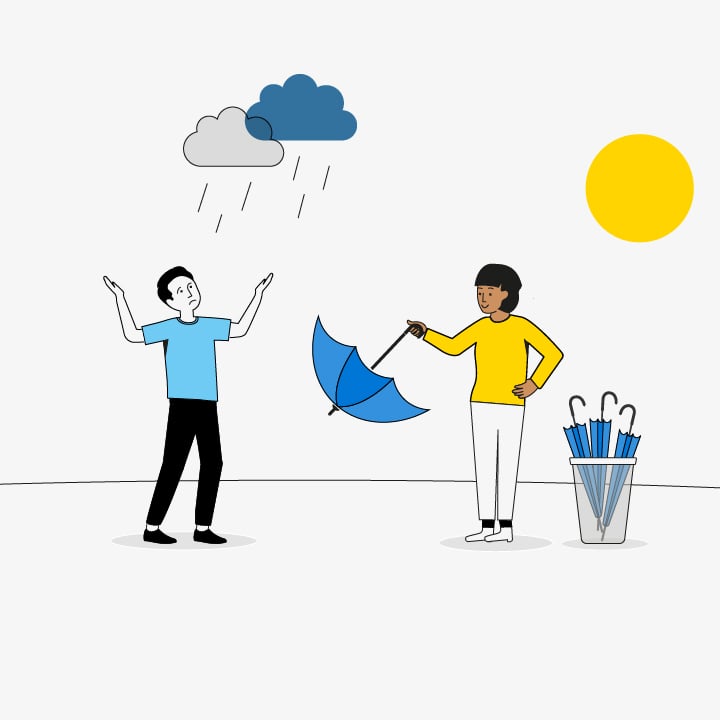Before you borrow
Here we look at some key questions to ask yourself before you borrow money.

Debt has become a common part of our daily finances.
While a mortgage might be the biggest debt most of us will have in our lifetimes, there may be many reasons why you’ve borrowed, or might need to borrow money, like home improvements, buying a car or to cover a period of short-term financial difficulty.
Here we look at some key questions to ask yourself before you borrow money.
Things to think about
It may sound obvious but there are some very important questions you need to answer before you borrow money
You should ask yourself if:
- you need to spend the money
- you have other ways of financing the purchase
- you can afford to pay back the money you’re planning to borrow
- you could wait until you can afford to buy the item without borrowing
- there’s another way of getting what you need, for example, swapping it for something else, buying it second-hand or getting it for free from a free recycling website
Can I afford to borrow money?
If you do decide to borrow money you should consider how much you can afford to repay.
This will depend on your personal financial circumstances and it is not recommended that anyone borrows money unless they are sure they will be able to comfortably afford the monthly repayments.
The monthly amount you will repay on a loan depends on the interest rate, the repayment term, and your own individual circumstances. It is also worth looking at how much you will repay in total over the whole term – you may end up paying back significantly more than you borrowed, especially if the repayment term is long.
Your repayments to a credit card or overdraft will be different.
A credit card will require you to pay a minimum monthly payment which will be much lower than what you owe. But be aware...paying only the monthly payment will take a very long time to clear the original amount you borrowed as interest will be added each month. If you continue to use the card during this time, borrowing back what you’ve repaid each month, it may take you decades to pay off the debt.
Your overdraft will be subject to your bank or building society’s terms and conditions and you might not need to make any payments towards paying it off. But there could be high charges for going over your overdraft limit, sometimes these are daily charges, and your overdraft facility could be removed by the bank at any time.
In April 2020 the rules for overdrafts changed. Banks can now only charge a simple annual interest rate and no additional charges or fees will be allowed.
Can I pay back the money if my circumstances change?
Make sure you are realistic about how much you can afford, especially if your circumstances change. Think about what would happen if:
- your mortgage, rent or bills increased
- you lost your income through redundancy or illness
How to choose the right type of credit
Shop around and compare deals to make sure you choose the right type of credit or loan for your situation. It’s important to look at:
- the interest rate and Annual Percentage Rate (APR)
- how much you would repay in total
- any penalties for missing payments or repaying it early
- the regular cost and whether this is fixed or variable
You can also read our introduction to different types of borrowing to find out about different types of loan such as credit unions, loans through your employer (if available) and peer-to-peer loans.
What is the APR?
APR stands for Annual Percentage Rate. This is the annual rate charged for borrowing and includes any fees or costs. As loans or credit agreements can vary in terms of interest rate, fees, penalties and other factors, the APR provides you with a ‘bottom-line’ number so you can easily compare rates charged by different lenders.
Will I qualify for credit?
A credit provider will look at a number of factors including your credit score and your personal financial circumstances before deciding how much it is willing to lend you as a loan or the credit card limit it will give you.
You can get an idea of your credit score by going to a credit agency such as Experian or Equifax.
Government Help for Households
The Government Help for Households site has useful information to see what cost of living support you could be eligible for:
- Help with energy bills
- Help with childcare costs
- Help finding work
- Income support
- Household costs
- Transport costs
More in this section
 Types of borrowing >
Types of borrowing >
Here we look at the different types of borrowing that might be available to you.
 Manage your debt >
Manage your debt >
If your financial situation seems like it is unmanageable then it might be a good idea to seek advice. In this short guide we take you through some options you have to manage your debt.
 Debt emergency >
Debt emergency >
If your debts are becoming unmanageable or you’re facing an emergency like court action or eviction, you’re not alone. There’s free help to support you.
 Debt advice locator >
Debt advice locator >
Managing your finances can be stressful when things are not going well. If your financial situation seems like it is unmanageable then it might be a good idea to seek advice.